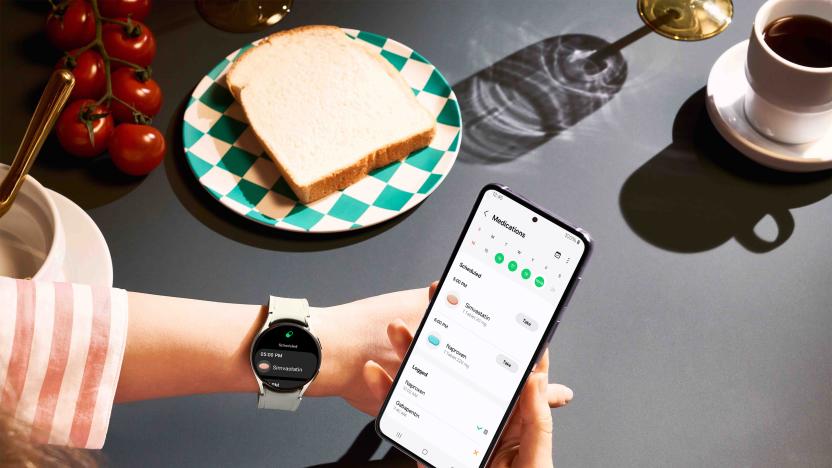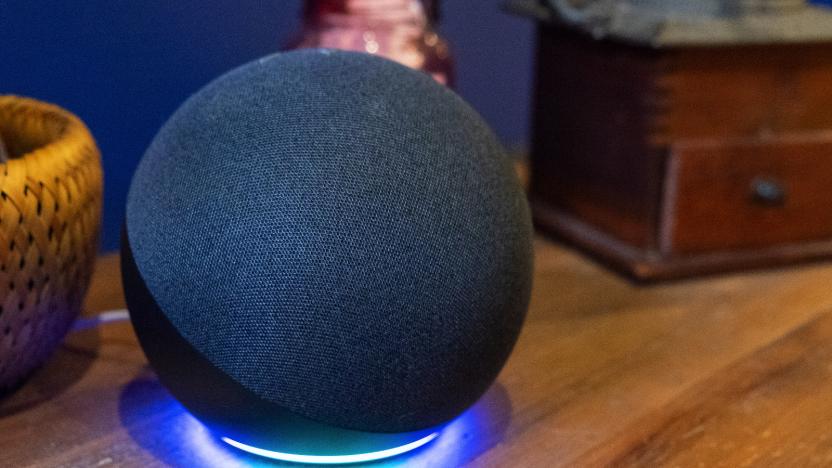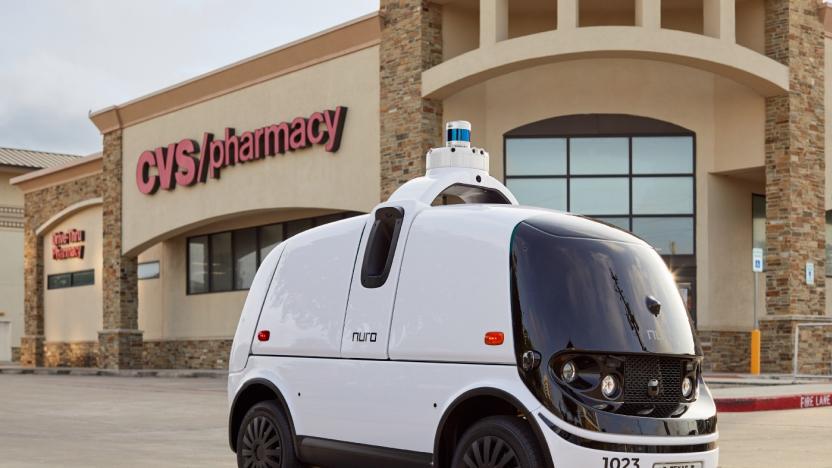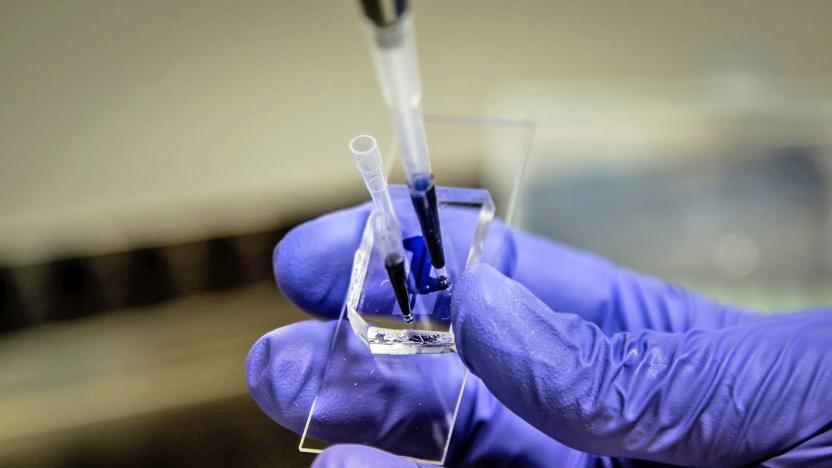medication
Latest

Samsung adds medication tracking to its Health app
Samsung has added a new medication tracking feature to its Health app and it's expected to launch in the US when the app updates later this week.

watchOS 9 will include improved sleep tracking and medication reminders
Apple Watch will also show how long you appear to be in a state of atrial fibrillation.

Alexa can now tell you if your washing machine stops or water is running
Amazon is introducing two new specific Alexa sound detectors for "water running" and "appliance beeping" that can be used to set up routines or reminders.

Nuro will test autonomous prescription delivery for CVS
Nuro will use its autonomous vehicles to deliver CVS Pharmacy prescriptions to customers in Houston.

Instacart is expanding Costco pharmacy deliveries nationwide
Instacart is now delivering medication from almost 200 Costco locations in seven states and Washington DC.

Alexa can refill your prescription and remind you to take it
Amazon's healthcare push now includes a simple but important convenience: the ability to manage y our prescriptions from your smart speaker. The company has partnered with Omnicell to let Alexa not only remind you when to take your medication, but to refill it when you're running low. Once you've linked your pharmacy account and enabled your pharmacy's skill, you'll get reminders based on your prescription data -- if you're not sure what you're supposed to take, you can ask. If you need more, you can tell Alexa to "refill my prescription" to put the pharmacy to work.

Walgreens offers next-day prescription deliveries through FedEx
Walgreens and FedEx announced today a partnership that will provide next-day prescription drug deliveries from Walgreens pharmacies. The service will be available nationwide for Walgreens customers and will cost $4.99 per drop off. Walgreens said some markets will have an option for same-day delivery, and the company plans to expand that service next year.

FDA approves its first marijuana-derived drug
In a nationwide first, the US Food and Drug Administration (FDA) has authorized the use of 'Epidiolex', a marijuana derivative which will be used to treat rare forms of epilepsy. Epidiolex -- also known as cannabidiol or CBD -- is a highly-purified version of the many psychoactive compounds found in marijuana, and does not result in a high.

ICYMI: The CGI car stand-in and smart pill dispenser
try{document.getElementById("aol-cms-player-1").style.display="none";}catch(e){}Today on In Case You Missed It: The Mill Blackbird is a vehicle chassis that car commercials can use as a stand-in, rather than getting to film with an actual new car. The Pillo is a smart medication dispenser that can recognize family members and automatically give their pill dosage. It's up on Indiegogo now. And we wanted you to see both the Converse sneakers made to play guitar with, and the autonomous light show that drums. As always, please share any interesting tech or science videos you find by using the #ICYMI hashtag on Twitter for @mskerryd.

Special microchip can prevent kidney damage from medication
Doctors have to make sure patients are getting just the right dose of medication, because some drugs (especially those administered to ICU patients) can cause kidney damage. This "kidney on a chip" device developed by a team of University of Michigan researchers could make the process easier. It replicates the environment inside our kidneys and shows how each medicine affects the organ.

PillDrill does smart medication tracking in style
Folks who rely on medication for a long period may forget their routine once in a while, especially the elderly or anyone with memory loss. It also gets rather dull when every conversation with the family starts with, "Have you taken your pills yet?" This is where PillDrill comes in. The system consists of a hub that resembles a cute-looking alarm clock, a couple of weekly pill strips containing RFID pods (you can add more strips, too), a dozen alphabetical RFID tags for your own bottles, a "mood cube" and a mobile app. You don't need to learn how to program your schedule: Just take your pills the way you're used to -- be it with the pods on the pill strips or with the original pill bottles -- and scan their RFID tags onto the right hand side of the hub as you go along.

UCSF's robotic pharmacy automatically distributes medication, scrutinizes human error (video)
Robots are slowly taking over the world, right? Well, their latest conquest is the pharmacy. The UCSF Medical Center has implemented three robotic pill-dispensing machines that handle and prepare medication that's dangerous to the common human. The process works as follows: doctor writes a prescription, hospital clerk sends it over to pharmacist, pharmacist enters slip into the computer, robot picks up it and does the dirty work. The automated machine will grab the proper dosage, package it and slap a label indicating instructions and patient info. Rather than fearing for their jobs (or lives), the folks at the UCSF at are excited about this robot-takeover 'cause it increases the time care-givers spend with patients while allowing pharmacists to work more efficiently with physicians in determining what medication to supply. The most impressive thing, we think, is that our robot pals have not had a single error since preparing 350,000 doses of meds. Take that, meatbags!

Vitality GlowCap review
The Vitality GlowCap concept's been floating about for years now, but it still slightly blows our minds -- you stick a tiny, battery-powered wireless computer on top of your pill bottle, which reminds you to take your medicine on time. Well, it turns out they aren't exactly a concept these days, as you can buy one for $10 with a $15 monthly plan, and we've actually spent the past month living with the chirping, glowing, AT&T-connected device, keeping a journal all the while. After the break, find out what a life-saving nag feels like. Note: Amazon's actually out of stock at the time of this writing, but Vitality says a new shipment should arrive tomorrow. %Gallery-114026%

Vitality GlowCaps smart pill bottle toppers now available on Amazon
Pill poppers rejoice! AT&T-connected Vitality GlowCaps are finally available on Amazon. The intelligent pill caps, which use flashing lights and audio reminders, as well as phone calls and SMS, to remind forgetful patients that it's down-the-hatch time, retail between $10 and $15 a month through a Vitality connectivity service plan. Details of GlowCap's functionality were still up in the air when we got our hands on one back in March, but it looks like AT&T and Vitality have ironed out all the smart Rx kinks. Basically, your pill bottle lights up and chimes when it's time for your meds. As soon as you open the bottle, adherence data is then sent via AT&T to Vitality, who then passes that data on to you, your doctor, and any other approved party, in the form of progress reports. They're also equipped to automatically refill your prescription when the bottle gets low. Considering you still remember what that little light means when it appears (and you don't have a penchant for over-medicating), GlowCap might just save your life. We've been using ours for about a month now, and still haven't kicked the bucket -- review coming soon.

Bluetooth-enabled meds to enter European bloodstreams
One of the great things about miniaturization is that it allows us to swallow things that a few short years ago were just a wonderful dream, from microprocessors to bowel scanners. Now a Swiss pharmaceutical company called Novartis AG is developing the Ingestible Event Marker (IEM), a chip that can be embedded in medication and, upon being activated by the patient's stomach acid, will send the doctor biometric data that gauges the drug's effectiveness (including heart rate, body temp, and body movements) via Bluetooth. The plan is to introduce the technology to monitor transplant recipients, although it could be expanded to other uses as well. If bioequivalence tests demonstrate that the device doesn't alter the effects of the pills, you could see 'em submitted for regulatory approval in Europe in the next 18 months.

P.L.E.A.S.E. is the polite and painless way to deliver drugs with lasers
Needles? Ouch. Pills? Yuck. Lasers? Awesome! This, we figure, is how a new means of delivering drugs was born. Pantec Biosolutions AG has created a device it calls the Painless Laser Epidermal System, or P.L.E.A.S.E. (We're not sure where the last E comes from, either.) P.L.E.A.S.E. is a means to deliver drugs via laser, effectively blasting tiny holes in your skin through which medication is absorbed, as demonstrated in a soothingly orchestrated video. The process is, apparently, completely painless both for the recipient and the deliverer too, thanks to a fancy touchscreen UI. The device has received marketing authorization, meaning it's able to be sold in Europe, but there is naturally no price or availability listed, so for now you'll just have to take your medicine the old fashioned way.

Dog-e-Minder keeps tabs on your dog's vitals so you don't have to (video)
You're already weighing down the massive head of your Frenchton with some sort of bark collar and GPS-enabled location tracker, so what's another pendant around the neck, anyway? Dog-e-Minder, which is cleverly being marketed to the "As Seen On TV!" crowd, is a battery-powered device that records the last time your pup (or cat, or iguana, or anything else that rocks a leash) ate, walked or took his / her medications. Essentially, owners simply mash the corresponding button after an event has occurred, and an internal timer keeps track of how long it has been since said event has happened. It also doubles as a dog identification tag (displaying the owner's contact information and the pet's name) whenever it's idle, and it's even available in a foursome of hues to match your canine's personality. The pain? $19.95, and the second one is thrown in absolutely free. Obligatory TV spot is after the break, and remember, "If you own a dog, this product will change your life." Change your life. P.S. - There's also the Accuwalker for those of you who have no clue when the last time your pet was walked. Shame on you.

Philips iPill -- it's like a regular pill, but with a microprocessor
It's been just about a year since we saw the patent for Philips' remote control "pill," and it looks like the thing is finally a reality. For those of you straining to remember that far back, the iPill (as it is now sadly known) is a miniature capsule that among its many charms contains a microprocessor, power supply, medicine reservoir and pump, and a radio so that it can remain in contact with external medical equipment. The pill's ability to accurately determine its position in the digestive tract enables it to deliver drugs precisely where they're needed, reducing dosage strength and side effects. According to Philips, the current design is a prototype, but it's suitable for serial manufacturing. Of course, this is not the first robot pill we've seen -- and it certainly won't be the last. Just the same, we think we'll refrain from swallowing any nanotech for the time being.

Dispense-A-Pill... er, automatically dispenses pills
If you're having trouble keeping track of what pill to take and when, you might want to turn your attention to the Dispense-A-Pill. Now look, we know that name isn't exactly pure gold, but when you've got a system that lets you store up to 90 days worth of medication and then automatically doles it out on a pre-programmed schedule -- naming conventions can probably take a backseat. The machine -- designed by Dr. Gazi Abdulhay -- can hold eight different types of medication, and the manufacturers plan to rent the units for less than the cost of an emergency call button. Now, if they can just create a system like this for making us lunch, we'll be all set. Check the video after the break to see the device in action.[Thanks, Yossi]

Philips' remote control pill may cure your allergies
Philips has applied for a patent of a remote controlled pill which can be signaled to dose your innards via an external, electronic trigger. Freaky, we know. These aren't just time-controlled coatings now, but automated medicament delivery systems whose course can be monitored inside the body via MRI or ultrasound before precision ejection. Better yet perhaps for allergy sufferers, the device could be designed to communicate with external sensors which would release drugs if say the atmospheric pollen count reached a certain level. Tip for the colon: never confuse the remote-controlled pill with Philips' remote control tablet. You can thanks us later. [via NewScientistTech]












